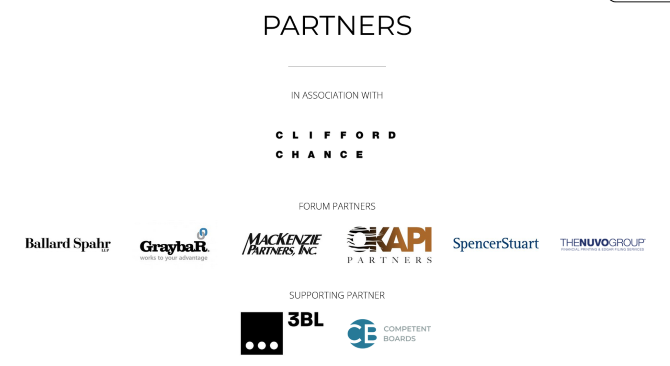Experts on a panel at Governance Intelligence’s recent Corporate Governance Forum in New York explored some of the best practices for conducting board assessments, a process that has attracted increased attention and that professionals may want to start working on now ahead of proxy season.
The board evaluation is an essential means for checking whether directors are working effectively and fulfilling their duties as a board, as committees and as individuals. Conducted well, the process should help boost performance and identify or provide the basis for addressing any issues. Corporate secretaries play a key role in ensuring they are a success.
Jessica Olich, head of governance and associate general counsel with Equitable, said she starts preparing during the fall for the upcoming evaluation to take place in time for the process to be described in the proxy statement. A growing number of companies are making these disclosures in greater detail.
‘Every corporate secretary should take a fresh look at their [board assessment] process every fall,’ Olich advised. As part of that annual review, she also speaks with the chair of the nominating and governance committee and/or the board chair about any changes they want to make.
Fellow panelist Arden Phillips, vice president, deputy general counsel and corporate secretary at Constellation Energy, noted that a corporate secretary should run any new questions they wish to add to the assessment survey past the general counsel or CEO before including them. They should also ‘socialize’ those changes with the nominating and governance committee and/or board chair before rolling them out, he added.
In the same vein, Olich emphasized that the corporate secretary needs to check for any sensitivities when considering new questions. ‘It’s a super-sensitive area,’ she commented.
Phillips said corporate secretaries also need to be careful when drafting questions for written evaluations that they won’t elicit a response from a director that reveals a risk-management or other problem at the company, in doing so putting that problem into the corporate record.
The questions used in surveys need to be intelligent and likely to produce information that can help the board operate more effectively without creating liabilities, he said. Examples might be: ‘Is there anything you’d like to know more about regarding the company?’ ‘Are the board’s agendas structured so that we have enough time to discuss necessary issues?’
Outside help
One of the key decisions corporate secretaries and boards need to make is whether to involve an outside adviser in the assessment process. Olich and Phillips both asserted the importance of using a third party for at least some years’ assessments.
Fellow panelist George Anderson, partner and leader of board effectiveness services at Spencer Stuart, explained that most boards that hire his firm do so to go beyond their own in-house survey. A critical part of doing so is the interviews conducted with board members, he said, as these can produce deeper and more nuanced information and enable directors to be a little more self-critical than a survey.
‘To do that we’ve got to get directors comfortable with the process and dialog,’ Anderson said. There are various ways of achieving this, including agreeing with the board ahead of time on the list of questions that will guide the interview – ‘There are no surprises, they don’t feel like there are any gotchas,’ he commented – and approaching the interview as a conversation rather than an interrogation.
Boards also bring his firm in if there is an issue that needs resolving, Anderson said. This might be a high-level question about whether the board is adding value through its engagement with the company’s strategy. It might be a more mundane issue such as board materials, or something more sensitive such as a perception that a director is underperforming.
Ultimately, the success of a board assessment relies largely on implementing any suggested changes that arise from the process. Olich said she presents the board with a balanced, concise report that includes some numerical data and has been able to develop action plans that include a few items to be worked on over the coming year.
She added that as part of implementing the plan, corporate secretaries should remind board members that, for example, 15 minutes are being added to a meeting to discuss a certain issue in accordance with the action plan developed from board feedback.
Anderson said it is important to have an action plan, which should be one page in length and outline the steps the board will take following the assessment. ‘Otherwise, it’s like you did all this work and what happened?’ he said.
More coverage of discussions at the Corporate Governance Forum is coming soon.
In the meantime, do you want to know more about how your peers are conducting their board assessments? Please join many other members of the profession by taking part in our online survey.
Completing the anonymous questionnaire will help us provide you with actionable benchmarking information to share with your board and other colleagues. Click here to take the survey. Responses are needed by December 20. Thank you for taking part!










